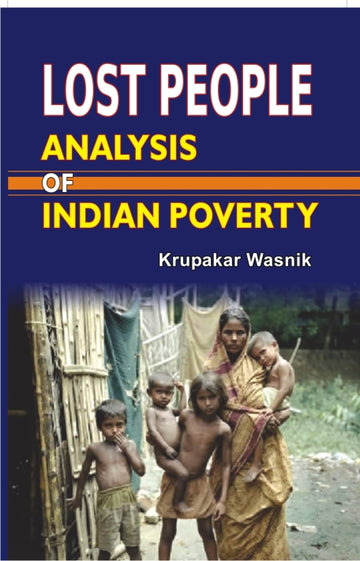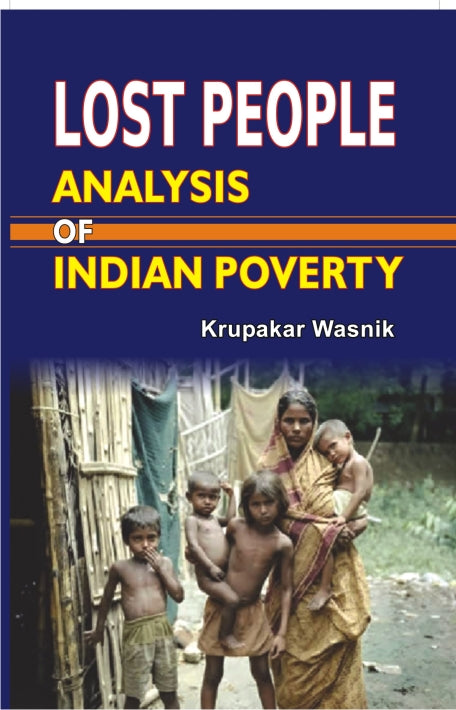Lost People: Analysis of Indian Poverrty
Regular price
₹ 642
Sale price
₹ 642
Regular price
₹ 690
Unit price
Save 7%
Tax included.
| Author | K.P. Wasnik |
| Language | English |
| Publisher | Gyan Books |
| Pages | 246 p |
| ISBN | 978-8182054936 |
| Book Type | Hardbound |
| Item Weight | 0.4 kg |
| Dimensions | 25 X 15 X 5 |

Lost People: Analysis of Indian Poverrty
Product description
Shipping & Return
Offers & Coupons
Conceptually, the notion of poverty is a complex phenomenon in its content and scope. The conceptualization of poverty depends on the approach adopted by the researchers to the phenomenon of the poverty. Poverty deprives the individual not only of material comforts but of human dignity. It rarely builds his character. The voluminous literature on poverty in India conveys the presence of controversies and the debate on poverty in India often generated more heat than light. This book overviews the different concepts of poverty, the debate on measurement of poverty the role of agriculture and rural development in poverty alleviation, gender aspects of poverty and also tries to analyse the correlation between happiness and poverty. The book also analyses that Indian poverty is man made phenomenon and social system is responsible for it. About The Author:- Krupakar Wasnik (b. 1-7-1959) did his doctoral degree in Agricultural Economics from Mahatma Phule Agricultural University, Rahuri, Maharashtra, graduation and post graduation from the College of Agriculture, Nagpur under Dr. Panjabrao Deshmukh Agricultural University, Akola (Maharashtra). He has contributed one book ‘Women in Agriculture – Strategy for Socio-economic Empowerment’ and this is the second book in the series. He has also contributed scholarly forty five popular articles on agricultural development and extension published in various journals and news papers. On behalf of the Ministry of Agriculture, Government of India, he visited Israel to participate in the course’ Research and Development for the Senior Professionals in India’ during August-September 1998. He has a rich field experience in the field of agricultural extension, agricultural development, project management and human resource development. Contents:- Contents, List of Tables, Foreword, Acknowledgements, 1. Concept of Poverty, Types and Measurement, • Introduction • Concepts of Poverty • Types of, Poverty • Who are Poor: A Characteristics •, Vulnerability of Poor • The Deprivation • Determinants, of the Poverty • Methods of Estimation of Poverty Line, • Measures of Poverty., 2. The Great Debate on Poverty Estimates, • Historical Background • Poverty Estimation by, National Sample Survey • Critics on the 55th Round of, NSSO • Poverty Estimation by Different Agencies and, Individuals • Critics on the Calories Norms., 3. Social Identity, Economic Exclusion and Poverty, • Three Thousand Years of India • Indices of, Development • Bad Social Relations, Exclusion due to, Poverty • Scheduled Caste • Socio-economic Condition, of Scheduled Caste • Occupational Structure of, Scheduled Caste • Tribal Population (Scheduled Tribes), • Occupational Structure of STs • Agricultural Land, Ownership by SC/ ST and poverty • Level of Education, 9, 11, 15, 17, 39, 65, 6 Lost People : An Analysis of Indian Poverty, and Poverty • Social Exclusion and Cultural Inequality, • Level of Assets and Poverty • Case Study of, Maharashtra • Entitlement and Poverty • Poverty, Eradication through the Programmes and Schemes., 4. Agriculture and Poverty Alleviation, • Pre-independence Period • Post Independence Period, • Agricultural Development and Poverty Alleviation •, Crises in Agricultural and Future of Indian Agriculture, • Agricultural Extension for Enhancing Agricultural, Production and thereby Reducing Poverty • Agriculture, Alone not the Answer., 5. Rural Poverty, • Who are Rural Poor • Socio-personal Characteristics, of Rural Poor • Objectives of Rural Development •, Integrated Rural Development and Sustainable, Livelihoods Compared • Rural Poverty and Non-farm, Employment • Micro Level Studies • Rural, Development Programmes and Impact on Poverty •, Empowering Rural Power an Integrated Model • Rural, Development Strategy in Eleventh Five Year Plan (2007-, 12)., 6. Gender Aspects of Poverty, • The Feminasation of Poverty • Hidden Poverty •, Gender Equity • Feminization of Agriculture • Socio-, Economic Issues of Farm Women • Empowerment of, Farm Women • Economic Empowerment • Social, Empowerment • Political Empowerment • Knowledge, Empowerment • Women Education and Poverty •, Women’s Income and Poverty • Strategy for Removing, Gender Based Poverty • Steps taken by the Government, for Empowerment of Women • The Major Schemes, for Women Implemented During Tenth Five Years Plan, • Schemes Proposed in Eleventh Plan., 109, 139, 167, CONTENTS:- 7, 7. Poverty and Happiness, • What Happiness is? • Is There Relation Between, Happiness and Poverty • Optimum Resource Theory., Appendix-I, Appendix-II, Bibliography, Index, 199, 213, 217, 219, 235 The Title 'Lost People: Analysis of Indian Poverrty written/authored/edited by K.P. Wasnik', published in the year 2009. The ISBN 9788182054936 is assigned to the Hardcover version of this title. This book has total of pp. 246 (Pages). The publisher of this title is Isha Books. This Book is in English. The subject of this book is Sociology. Size of the book is 14.34 x 22.59 cms Vol:-
- Sabr– Your order is usually dispatched within 24 hours of placing the order.
- Raftaar– We offer express delivery, typically arriving in 2-5 days. Please keep your phone reachable.
- Sukoon– Easy returns and replacements within 7 days.
- Dastoor– COD and shipping charges may apply to certain items.
Use code FIRSTORDER to get 10% off your first order.
Use code REKHTA10 to get a discount of 10% on your next Order.
You can also Earn up to 20% Cashback with POP Coins and redeem it in your future orders.








